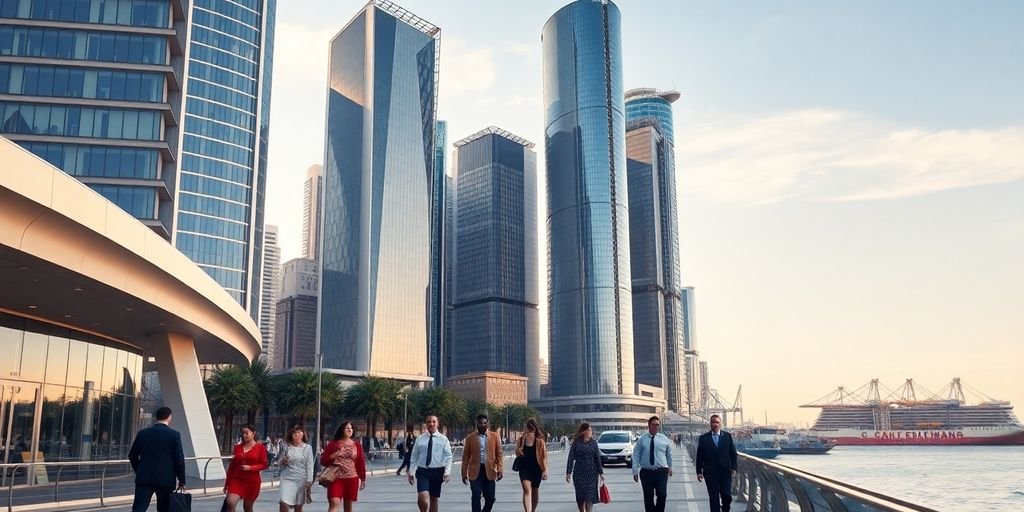The United Arab Emirates is rapidly advancing its economic diversification, with non-oil sectors now forming the backbone of its robust growth. Strategic initiatives and global partnerships are accelerating the nation’s shift towards a knowledge-based, sustainable economy, significantly boosting GDP and foreign trade well ahead of ambitious targets.
UAE’s Economic Resilience And Diversification Drive
The United Arab Emirates’ economy demonstrated remarkable strength in 2024, with its real Gross Domestic Product (GDP) reaching Dhs1.776 trillion, marking a 4 percent increase from the previous year. This growth was predominantly fueled by the non-oil sectors, which expanded by 5 percent to Dhs1.342 trillion, now contributing a significant 75.5 percent to the national economy. This performance underscores the success of the UAE’s strategic shift away from oil dependency towards a more diversified, innovation-driven model.
Key Takeaways:
- The UAE’s real GDP hit Dhs1.776 trillion in 2024, a 4% increase.
- Non-oil sectors contributed 75.5% of the GDP, growing by 5%.
- The nation is on track to achieve its Dhs3 trillion GDP target by 2031.
- Non-oil foreign trade targets are expected to be met four years early.
Sectoral Growth And Contributions
The diversification strategy has translated into impressive growth across various non-oil sectors. Transport and storage emerged as the fastest-growing contributor to GDP in 2024, posting a 9.6 percent year-over-year increase, largely driven by record airport traffic. The building and construction sector also saw substantial growth at 8.4 percent, supported by significant urban infrastructure investments.
Other high-growth areas include:
- Financial and insurance activities: Up 7 percent
- Hospitality (hotels and restaurants): Up 5.7 percent
- Real estate activities: Up 4.8 percent
These sectors are pivotal in supporting the non-oil GDP and reinforcing the UAE’s ambition to become a global hub for business, finance, tourism, and logistics.
The leading non-oil contributors to the UAE’s GDP by the end of 2024 were:
- Trade: 16.8 percent
- Manufacturing: 13.5 percent
- Financial and insurance services: 13.2 percent
- Construction: 11.7 percent
- Real estate activities: 7.8 percent
Strategic Initiatives And Global Trade Expansion
Abu Dhabi, the capital, is actively implementing measures to simplify business processes and attract foreign investment. Initiatives include the establishment of the Abu Dhabi Registration Authority (ADRA) as a centralized point for business registration, a strategic roadmap for the Abu Dhabi Chamber of Commerce and Industry, and the creation of a Family Business Council to support family-owned enterprises. These efforts aim to enhance the ease of doing business and foster a competitive environment.
The UAE’s non-oil foreign trade is booming, with the nation on track to achieve its $1.1 trillion trade target by 2031 four years ahead of schedule. In the first quarter of 2025, non-oil foreign trade reached AED835 billion ($227.5 billion), an 18.6 percent increase year-on-year. Non-oil exports experienced exceptional growth, surging by 40.7 percent annually to AED177.3 billion ($48.3 billion), now accounting for over 21 percent of the total non-oil foreign trade.
Trade with the UAE’s top 10 trading partners continued to expand significantly, including:
- India: 31 percent growth
- Saudi Arabia: Over 127 percent growth
- Turkiye: 8.3 percent growth
- China: 9.6 percent growth
This robust performance across diverse sectors and strong international trade relations solidify the UAE’s position as a dynamic and globally competitive economy, well on its way to achieving its ambitious long-term economic visions.
Sources
- Abu Dhabi’s ports are driving the UAE’s post-oil transformation, CNN.
- UAE economy hits Dhs1.776tn as non-oil sectors drive growth, Gulf Business.
- UAE GDP hits Dh1.776 trillion in 2024, driven by 5% growth in non-oil sectors, Gulf News.
- UAE’s Abu Dhabi sets out measures to help business get away from oil, Reuters.
- UAE on track to hit $1.1tn trade target 4 years early as non-oil sector booms: Sheikh Mohammed, Arabian Business.
